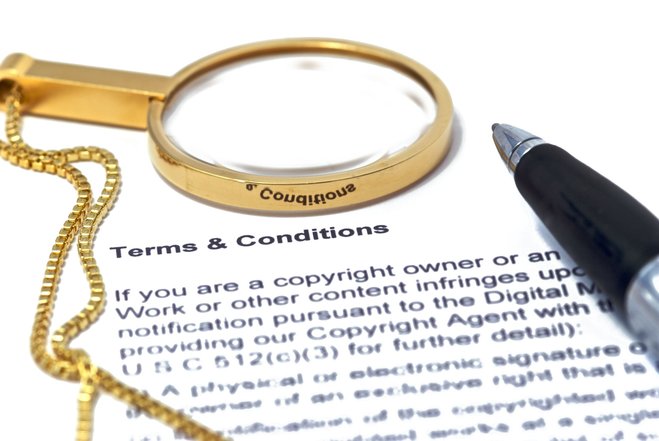There are some things we don't talk about. Googling oneself, taking vain selfies, stuffing oneself with fast food or looking the other way to avoid conversation - we'd rather keep that to ourselves. The one thing where we always lie is when we're checking off T&Cs. Whether we install programs and updates or make purchases, we usually scroll through the often mile-long terms and conditions at lightning speed to click the "I agree" button. The show must go on after all! What we tend to forget: we're entering into a contract sight unseen.

There's always been a fear of the fine print that, when it comes to insurance contracts, has already given so many signatories sleepless nights. While this is a special case involving an important decision, buying movie tickets online, logging on to a public WLAN or purchasing an app are normal everyday activities. That's why consumer protection activists are calling for a 200 word limit on T&Cs to render them more readable and transparent. Most situations are governed by laws that cannot be overridden by terms and conditions any way. And while there are regulations to prevent surprise clauses, many documents still contain various discussion-worthy passages.
They probably want us to agree blindly. As "The Atlantic" found out, it would take an average American 76 work days to read through the terms and conditions they're usually presented with. The average length of T&Cs is 2.514 words with a few outliers. For example, customers of Deutsche Bahn are expected to read through 178 pages of terms and conditions, that's enough content for a small novel. If you managed read all of Paypal's terms, kudos to you and hats off to your perseverance! Is it even possible to read everything? In other words: who'd honestly spend a cozy evening in their armchair with tea and a couple of T&Cs? Nobody - and that's precisely what companies are counting on when they conceal clauses in their terms that users would otherwise never agree to.
 Long trains, lengthy terms and conditions – Deutsche Bahn
Long trains, lengthy terms and conditions – Deutsche Bahn
Access rights and permissions are a common example especially among cellphone apps. Many programs hide the true nature of their intentions when they ask for access to your personal data. For instance, why would a small game need to use your calendar, address book or camera? If the reasons behind the requests were stated in plain English, many would probably get rid of the software right away. But when they're buried in non-readable English on what feels like page 32, we happily consent. The Bank of America, for example, reserved the right to take pictures or calls unasked and Apple had so many ambiguous clauses in their terms for iTunes that the company was forced to be more transparent by the courts. T&Cs can also contain clauses for automatic subscription extensions, consent to marketing calls or hidden costs, many of which wouldn't hold water in court. Here, companies simply rely on the user's reluctance to sue them over small claims.
It's worth taking a closer look at what people blindly agree to. Pranksters and privacy groups occasionally conduct amazing experiments to this effect. One of their made-up clauses obligated WLAN users in London to give up their firstborn child. This didn't stop too many eager web surfers, maybe they didn't like their kids that much. In another case, 22,000 festival visitors agreed to clean toilets for 41.7 days, scrape gum of sidewalks and (my personal favorite) hug stray pets. The developer of a sound application included a clause in his terms that users had to provide him with a steady supply of waffles. Gamestation, a game developing company, even stipulated that users surrender their souls to them in exchange for playing their games, just for laughs of course. Winkelmann und Hinkeldein GbR, the German masters of T&Cs, included a clause that obligated licensees to settle legal disputes through traditional duels - for claims below €25,000 and with water pistols, mercifully.
 Waffles for programmers
Waffles for programmers
To be fair, having to explain legal matters isn't exactly the stuff romance novels are made of. Statutory provisions (if present) only complicate matters - but does Amazon really have to use sentences that span a whopping 12 lines? Granted, making their software Lumberyard available in the event of a zombie apocalypse is not without an element of humor but more transparent terms would still be preferable. It's up to the legislator to step in. There are already proposals for mandatory validation checks by government institutions. If anything, companies could be required to highlight important passages, e.g. clauses concerning costs. In conjunction with the aforementioned 200 word limit, this would be a step in the right direction towards more efficient consumer protection. I'd very much like to see Apple condense their currently 14 page T&C down to 200 words. I'd even read them!
Whether these modifications would be enough to protect our youth is questionable. The terms and conditions of Snapchat, a favorite among teens, is considered the seventh circle of hell by privacy groups. The program can pretty much do anything and everything with the data generated by its users. This includes processing and deleting messages, creating user profiles for advertising as well as verifying, archiving and distributing phone numbers. They could just replace their terms with "We can do whatever we want!!!". If anything, that would be more honest. When this issue was recently brought up in a popular forum, there was no sign of outrage. The users simply didn't care.
What I would like to know: do you read T&Cs? Be honest!




Well, what can I say. I am familiar with bilateral contracts but not with adhesion ones. I glance, kind of skimming T&Cs and try not to compromise by giving out too much personal info. In short, fine contract print is duress.
In a world of superficial and unpredictable people it seems easier to deceive and tease them.
The last time I tried to read a T&C, the purchase timed out before I was done, and I had to start all over again. That was the LAST time I'd read one.
I like to read these blogs because I find them constructive and informative on the subject matter
The BIG problem in America is the way corporations are trying to ram a 'private legal system' down consumers' throats by demanding that instead of suing them, you agree to 'arbitration'.
Arbitration is nothing but a scam. The 'unbiased' arbitrators are paid by the corporation, and guess which way the vast majority of their 'unbiased' judgements go? Yes, you generally get a choice among three arbitrators, but all three are paid by the outfit with whom you are in dispute.
And lastly, they make sure that the arbitrator is somehow ALWAYS located on the other side of the country (even if they have to fly them there), and that you have to show up for the hearing at your own expense, and then again when the 'judgement' is rendered.
The entire system is designed to make you just shut up and go away.
I have read many T&Cs in the past, but not much in the last few years. The problems we encounter these days on so many of them is that 'they' force us to view several pages' worth of T&Cs in a small window that may generously measure 2" high by 1" wide (for example); it takes "forever" just to scroll through that text, let alone read it, as well. Since 'they' don't WANT me to read it, I'll comply by not reading it. There are plenty of options in court, should I ever find myself in that situation. One is mentioned by [Chas] below - agreed to under duress. If I download software, usually I need to use it in a timely manner, not waste an hour or two (or longer) reading, deciphering, and applying to my situation some three-sentence, ten-page "agreement" written by an English-as-a-fourth-language would-be legal writer.
The situation that bothers me most is being expected pay for software, and THEN read and agree to T&Cs before I can use it. Windows is one example, and there are many others. Once again, they DON'T EXPECT and DON'T WANT us to read them, hence the enforced childish game playing.
A 200-word limit sounds almost heaven-sent - IF it would ever be implemented. I could personally - and realistically - put all required T&Cs into less than 200 words for any software product, but I don't see any of these companies asking for such talent. I'm sure there are many of us who are qualified as technical, legal, and medical writers, and who would love to get paid by these same companies for re-writing their convoluted T&Cs to manageable terms with real world meaning for the average user. Ghastly, I’ve used 298 words to state my case! :-p
I skim through them looking for anything out of the ordinary. On occasions I have e-mailed them afterwards declaring that I ticked the agreement box under duress because they gave me no real choice, but that I wasn't actually agreeing to provision x.
But I completely agree that the situation is ludicrous, especially when, as you say, "Most situations are governed by laws that cannot be overridden by terms and conditions any way". Why on earth does one have to agree that I can't used their trademarks, when trademark laws specify just that anyway? I've tried asking, but never gotten an answer. I tried booking tickets online, but the T&Cs were so ridiculous (including saying that by agreeing I was also agreeing to further, separate, pages), that I cancelled my half-completed booking and made the booking by 'phone instead, where I didn't have to agree to any T&Cs! Did that mean that I was therefore legally able to use their trademarks? Simply asking that question shows the absurdity of the situation.
On another occasion when registering online, I had to tick the box to say that I agreed with their (linked) terms and conditions, so I followed the link, read them (very quickly; not thoroughly, and I'm a fast reader), returned to the registration page, and found that it had timed out! I wrote to them pointing out that the time they allowed to read them showed that they didn't actually expect people to read them anyway, which means that they expect people to lie about it, and that wasn't exactly a good way to start a relationship. I don't think I ever got an answer from them, either.
Are you kidding? Read that gobbeldygook? I get annoyed when a website won't let me just check a box and go on without at least linking to their half-million word "agreement" page, and sometimes it actually makes me scroll all the way through the document before it highlights the check box so I can go on to commit to whatever mundane item or service I happen to be desiring at the moment. They can make me go there but they can't make me read it, and even if they did they can't make me comprehend it.
(Actually, I really don't have any secrets that I need to protect, I don't own a lot, and I just figure that if you don't consent to whatever the company has demanded, there is no other option. Examples: T&C for Microsoft Windows, your bank's website, and your credit card issuer.)
How about the argument that any such T&Cs are agreed to under duress ( and therefore void ) as you have to agree in order to use the item that you've paid for!
guilty! I skim read the t&t's. So much of them are exactly the same, only worded slightly different, ie proper behaviour online. My idea is a simple universal t&c, about 200 words limit, which should cover all the things repeated in almost all t&c's. Then extra 200 words for the type specific, ie games t&c, sales t&c, delivery t&c, insurance t&c, ect. The 200 word t&c would be on a government website, where each bullet point could be expanded with clear explanations of each point. Same for the extensions.
So that would mean a clear 200 word general terms and conditions, plus another 200 word type specific terms and conditions. Consider, after you have read the first 200 word general terms and conditions a few times, you would probably skip to the more important specific terms and conditions.
This would have a side effect of no more unfair terms and conditions.
I try to be conscientious in reading all the small print of important stuff - like insurance policies, for example. But I confess that I don't usually read the T's & C's for software or online traders.
I know I should, but I'm 74 years old - I haven't got that much time left!
It's a widely accepted fact that the most often told lie in the world is "I have read the Terms & Conditions".
It would be wonderful to see all T's & C's condensed to 200 words, but without legal compulsion it's not going to happen.
The thousands of words used by most organisations come down to one simple trick - obfuscation. The longer and more boring the document, the less likely we are to read it, thus the more the organisation can get away with imposing on us.
I do skim read T&Cs as a previous poster mentioned, but I tend to focus more on privacy and data collection, and skip the parts about their IP ownership.
Sure T&Cs need to be more clear, but 200 words is very restrictive.
When I have entered into contracts in person, I always read the T&Cs in front of the person who wanted me to sign. It was very satisfying to see them start fidgeting as they waited, and waited and waited... Clearly I was taking up their time as much as I was taking up MINE.
Doing that also made me aware that not everything was as clear as the verbal condensed version I was given.
Thank you.
If I recall correctly, didn't some software companies have a 'warning notice' that 'by opening this sealed package, you agree to the terms and conditions..' which you couldn't see until after you opened the package and started installing the software?
I' m slightly ashamed to say I don't read the T&Cs, the main reason being the box they're displayed in is so small.
They are probably available on the company's website but I want to start using the software immediately and can't be bothered to go there to read it.
Your idea of truncating them to 200 words is a wonderful idea.
On a separate note, it would be wonderful if the same legislation, (if it EVER comes about), was applied to lawyers letters.
Only the government can limit this kind of proliferation, and that's highly unlikely in corp-dominated nations.
Shakespeare said it - "kill the lawyers"
This blog article is a very good wake-up call to those who just accept T&C sign-up documents without reading them and understanding the implications of agreeing. I also agree that too many of them are far too long, and possibly a reflection of the site/company legal departments insistence or involvement (as well as marketing wanting to have their slice of the lucrative "browsing habits" data).
I have only bailed out of installing a few utilities and media players over the years, because I was not happy with the T&C presented.
I DO believe that teens are too blase with their privacy, because they believe that their IOS device is immune to malware, or that any bad stuff will be fixed by Mom & Dad, not at THEIR expense.
I think if enough people complain, or stop using software that has bad T&C, then MAYBE companies will start to listen. Actually doing something about it is another matter, but I hope the privacy groups and court cases move things into a better, and safer direction.
No I am afraid.
Will do a bit more now.
Thanks for the information.
Cheers
Alex
Not fully to be honest but I have learned to skim the text.
If I see something that doesn't quite equate I then read it
more fully.
I have to admit though that I am taking a foolish gamble in
believing I can trust people to do the right thing.
I'm embarrassed to have to admit that I stopped reading the terms and conditions some time ago. I fully agree that if they were limited to 200 words I again would read them. I'm afraid though that would mean a huge reduction in the software I would be purchasing. At least now I can claim stupidity for not wading through the long and tedious terms and conditions.
Of course not! The Constitution of the United States is much shorter and more readable just about any legal document.
After you are finished reading 30 pages of marketing puffery, who wants to read that stinking agreement?
Great commentary Sven. I used to write TOT for businesses and I couldn't agree more. in NZ and Australia the only requirement was that the terms must be "disclosed". In Australia they went one step further and legislated that printed Terms have to be a minimum font size of 11. People couldn't read the terms because the fonts were to small, and that caused debt collection problems.